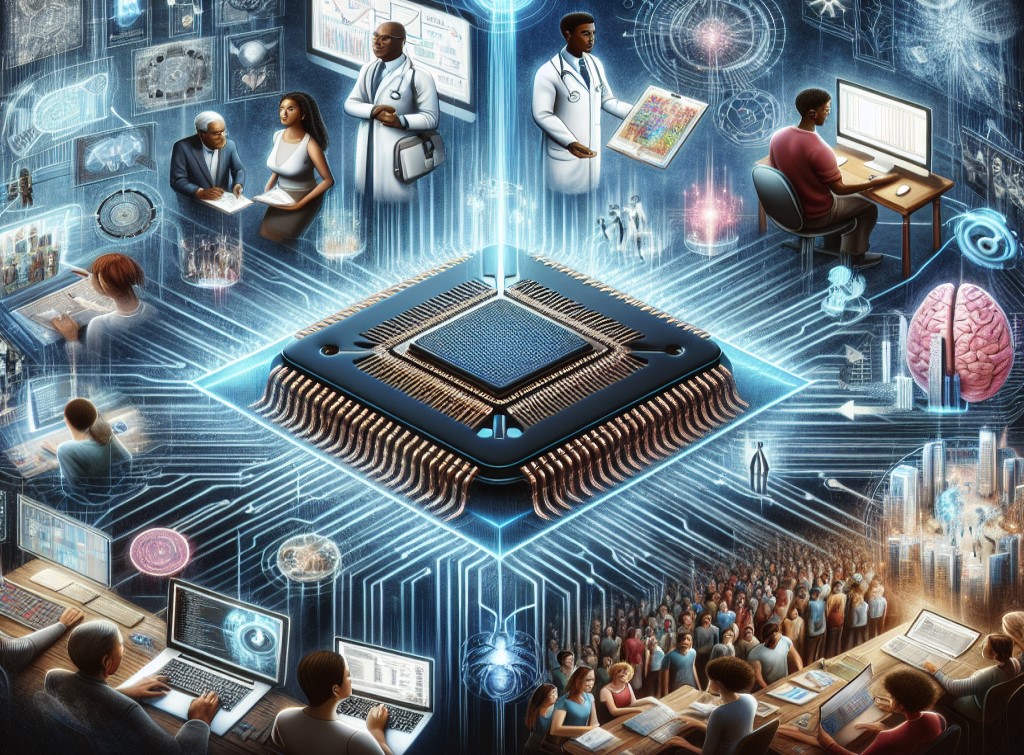In the digital age, computer science has become a cornerstone of modern society. Its influence permeates every aspect of our lives, from communication to healthcare, from entertainment to national security.
At the heart of this revolution are computer scientists. These professionals are the architects of the digital world, shaping our present and future with their innovative ideas and technological prowess.
This article delves into the multifaceted role of computer scientists. It explores their contributions to various sectors and the profound impact they have on societal development.
We will also delve into the realm of cryptologic computer science. This specialized field plays a crucial role in maintaining national security and safeguarding our digital infrastructure.
The article further examines the opportunities for direct hire in the profession. It sheds light on the 9-month register for computer scientists, a unique employment avenue in the federal sector.
Whether you are a computer science professional, a student considering a career in this field, or simply interested in the societal implications of technological progress, this article offers valuable insights.
Join us as we explore the impact of computer science on society, and the pivotal role of computer scientists in shaping our digital future.
The Role of a Computer Scientist
A computer scientist is a professional who uses their expertise in algorithms, data structures, and computational theory to solve complex problems. They design and develop software, create efficient solutions for data processing, and innovate new technologies.
Their work is not confined to coding or programming. It extends to the development of algorithms and data structures, the design of computer hardware and software, and the creation of efficient ways to solve computing problems.
Computer scientists also play a crucial role in the development of artificial intelligence and machine learning. They design systems capable of learning from data, recognizing patterns, and making decisions, driving advancements in fields ranging from healthcare to finance.
Moreover, computer scientists contribute to the ethical considerations of their innovations. They navigate the challenges of data privacy, algorithmic bias, and the societal implications of automation and artificial intelligence.
In essence, computer scientists are the architects of the digital world. Their work shapes the way we live, work, and interact in the 21st century.
Historical Evolution of Computer Science
The field of computer science has its roots in mathematics and engineering. Early pioneers like Ada Lovelace and Alan Turing laid the groundwork for the discipline, envisioning machines capable of complex computations.
The mid-20th century saw the advent of the first programmable computers. These machines, though primitive by today's standards, marked the beginning of the digital age. They paved the way for the development of modern computing systems.
Over the decades, computer science has evolved rapidly. From mainframe computers to personal computers, from the internet to artificial intelligence, the field has continually pushed the boundaries of what is technologically possible.
Computer Science and the Digital Revolution
The digital revolution of the late 20th and early 21st centuries owes much to computer science. Computer scientists have been instrumental in the development of the internet and digital communication.
They have created the algorithms that power search engines, social media platforms, and e-commerce sites. They have developed the software that enables digital communication, from email to video conferencing.
Moreover, computer scientists have driven the mobile revolution. They have designed the operating systems and apps that power smartphones and tablets, transforming the way we access information, communicate, and entertain ourselves.
Specializations in Computer Science
Computer science is a broad field with numerous specializations. These range from software engineering and data science to artificial intelligence and computer graphics. Each specialization requires a unique set of skills and knowledge, offering different career paths and opportunities.
One such specialization is cryptology, the study of secure communication. Cryptologic computer scientists play a crucial role in maintaining the security and integrity of digital communication, making them indispensable in today's interconnected world.
Cryptologic Computer Scientists and National Security
Cryptologic computer scientists are at the forefront of national security. They design and implement secure communication systems, protecting sensitive information from cyber threats. Their work is vital in safeguarding national secrets, ensuring secure military communication, and protecting critical infrastructure.
These professionals also contribute to the fight against cybercrime. They develop tools and techniques to detect and prevent cyber attacks, helping to maintain the security of digital platforms and networks.
In essence, cryptologic computer scientists are the guardians of the digital world. Their work is crucial in maintaining trust in digital communication, protecting privacy, and ensuring national security.
The Diverse Career Paths of Computer Scientists
Computer science offers a wide array of career paths. Some computer scientists work in academia, conducting research and teaching the next generation of professionals. Others work in industry, developing software, designing systems, or managing IT infrastructure.
Many computer scientists work in specialized fields, applying their skills to specific industries. For instance, some work in healthcare, developing systems for medical imaging or patient data management. Others work in finance, designing algorithms for high-frequency trading or risk assessment.
Regardless of the path they choose, computer scientists play a crucial role in driving technological innovation. Their work shapes the future, pushing the boundaries of what is possible in the digital world.
Societal Contributions of Computer Scientists
Computer scientists contribute significantly to society. Their work drives technological innovation, transforming various sectors and improving lives. From healthcare and education to finance and entertainment, the impact of computer science is profound and far-reaching.
Moreover, computer scientists play a crucial role in addressing societal challenges. They develop solutions to complex problems, leveraging computational thinking and technological innovation. Their work is instrumental in advancing our understanding of the world and shaping the future.
Advancements in Healthcare
In healthcare, computer scientists have made significant contributions. They have developed systems for medical imaging, patient data management, and telemedicine, improving the quality and accessibility of healthcare services.
Moreover, computer scientists have played a crucial role in the field of genomics. They have developed algorithms for sequencing genomes, contributing to advancements in personalized medicine and genetic research.
In essence, computer scientists are transforming healthcare. Their work is driving innovation, improving patient care, and advancing medical research.
Economic and Job Market Impact
The economic impact of computer science is substantial. The industry contributes significantly to GDP growth, creating jobs and driving economic development. Moreover, the demand for computer scientists is high, making it a lucrative career path.
Computer science also drives innovation in other sectors. From tech startups to established corporations, companies across industries rely on computer scientists to develop software, manage data, and drive digital transformation.
In essence, computer science is a key driver of economic growth. It creates jobs, fosters innovation, and contributes to the prosperity of nations.
Addressing Global Challenges
Computer scientists also play a crucial role in addressing global challenges. From climate change and energy efficiency to poverty and disease, they develop solutions to complex problems, leveraging computational thinking and technological innovation.
For instance, computer scientists are developing models to predict climate change, helping policymakers make informed decisions. They are also designing systems for renewable energy, contributing to the transition towards a sustainable future.
Moreover, computer scientists are leveraging artificial intelligence to address health challenges. They are developing algorithms for disease detection and drug discovery, contributing to advancements in healthcare.
In essence, computer scientists are at the forefront of solving global challenges. Their work is instrumental in shaping a better future for all.
The Future of Computer Science
The future of computer science is promising and exciting. As technology continues to evolve, the role of computer scientists in shaping the future becomes even more significant. They are at the forefront of technological innovation, driving advancements in various fields and addressing societal challenges.
Moreover, the demand for computer scientists is expected to grow. As digital transformation accelerates, the need for skilled professionals who can develop software, manage data, and drive innovation will increase. This presents numerous opportunities for those considering a career in computer science.
Emerging Technologies and Computer Science
Emerging technologies such as artificial intelligence, quantum computing, and blockchain are shaping the future of computer science. These technologies present new challenges and opportunities for computer scientists, requiring them to develop new skills and adapt to changing environments.
For instance, in the field of artificial intelligence, computer scientists are developing algorithms for machine learning and deep learning. They are also working on ethical issues related to AI, such as bias and privacy.
In the field of quantum computing, computer scientists are exploring new computational models. They are developing algorithms for quantum computers, which have the potential to solve complex problems that are currently intractable for classical computers.
Education and Continuous Learning in Computer Science
Education and continuous learning are crucial in computer science. As technology evolves, computer scientists need to update their skills and knowledge. This requires a commitment to lifelong learning and a passion for innovation.
Moreover, the interdisciplinary nature of computer science requires computer scientists to have a broad knowledge base. They need to understand not only computer systems and algorithms but also the applications of computer science in various fields.
In essence, education and continuous learning are key to a successful career in computer science. They enable computer scientists to stay at the forefront of technological innovation and contribute to societal development.
Conclusion
In conclusion, the impact of computer science on society is profound and far-reaching. From healthcare to finance, from entertainment to national security, computer scientists play a pivotal role in shaping our world. Their work drives technological innovation, fuels economic growth, and addresses societal challenges.
As we look to the future, the role of computer scientists will only become more significant. With the advent of emerging technologies and the increasing demand for digital solutions, the opportunities for computer scientists are vast. Indeed, the future of computer science promises to be as exciting and impactful as its past.





